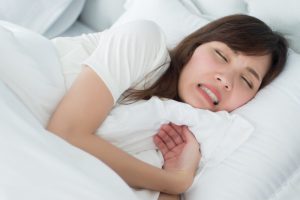 While obstructive sleep apnea tends to be more common in men, women are still at risk for the disorder – and in some ways it may be even more dangerous for them. Recent studies suggest that women who suffer from sleep-disordered breathing might be more likely to suffer life-threatening heart problems. Here’s what you need to know about the importance of uninterrupted slumber when it comes to women’s health.
While obstructive sleep apnea tends to be more common in men, women are still at risk for the disorder – and in some ways it may be even more dangerous for them. Recent studies suggest that women who suffer from sleep-disordered breathing might be more likely to suffer life-threatening heart problems. Here’s what you need to know about the importance of uninterrupted slumber when it comes to women’s health.
What is Sleep Apnea?
When you have sleep apnea, you repeatedly stop breathing while you’re asleep, which can happen numerous times each night and prevent you from getting a full rest. (The body is forced to wake up constantly to restart the flow of air.) The most common kind is obstructive sleep apnea, which involves the airway becoming physically blocked in some manner.
How Many Women Have Sleep Apnea?
While sleep apnea is more common in men than women, the gap is not as large as was once believed. One study shows that about 11% of women of all ages have a form of sleep apnea (compared to 27% for men). Notably, this number rose to 20% when looking solely at women who have reached menopause.
What are the Health Risks of Sleep Apnea for Women?
Over time, obstructive sleep apnea can lead to heart attacks and other kinds of heart problems. This is largely due to the frequent decreases in oxygen putting a strain on your cardiovascular system. Research performed by the Radiological Society of North American found that women who suffer from obstructive sleep apnea or snoring may suffer from cardiac problems earlier than men do. The same study also suggested that sleep apnea might be far more underdiagnosed than originally thought. If you think there’s a chance you might be suffering from sleep apnea, it’s far better to have it treated now rather than wait for problems to arise.
How Do You Know If You Have Sleep Apnea?
Women with sleep might suffer from various symptoms, including:
- Loud, frequent snoring
- Gasping sounds while asleep
- Headaches, dry mouth, sore throat in the morning
- Trouble concentrating
- Excessive drowsiness during the day
- Insomnia
- Irritability during the day
- Anxiety or depression
- A lack of energy after a full night of sleep
- Forgetfulness
Not all these symptoms will necessarily occur at once, but any of them can give you reason to schedule an appointment with a sleep dentist or your doctor. They can help arrange for a sleep study to diagnose the problem and start you on the path towards treatment.
Women might have less chance of suffering from sleep apnea overall, but don’t think you can afford not to be concerned about the condition; if you think there’s a problem with the quality of your sleep, your heart will thank you for correcting it as soon as possible!
About the Author
Dr. Keane Fedosky has over two decades of experience helping patients suffering from sleep apnea and snoring get a full night’s slumber again. He’s a member of the American Academy of sleep medicine and is well-versed in the use of oral appliance therapy. To schedule an appointment at his Plano sleep clinic, Sleep Rehab, visit his website or call (972) 753-3737.
